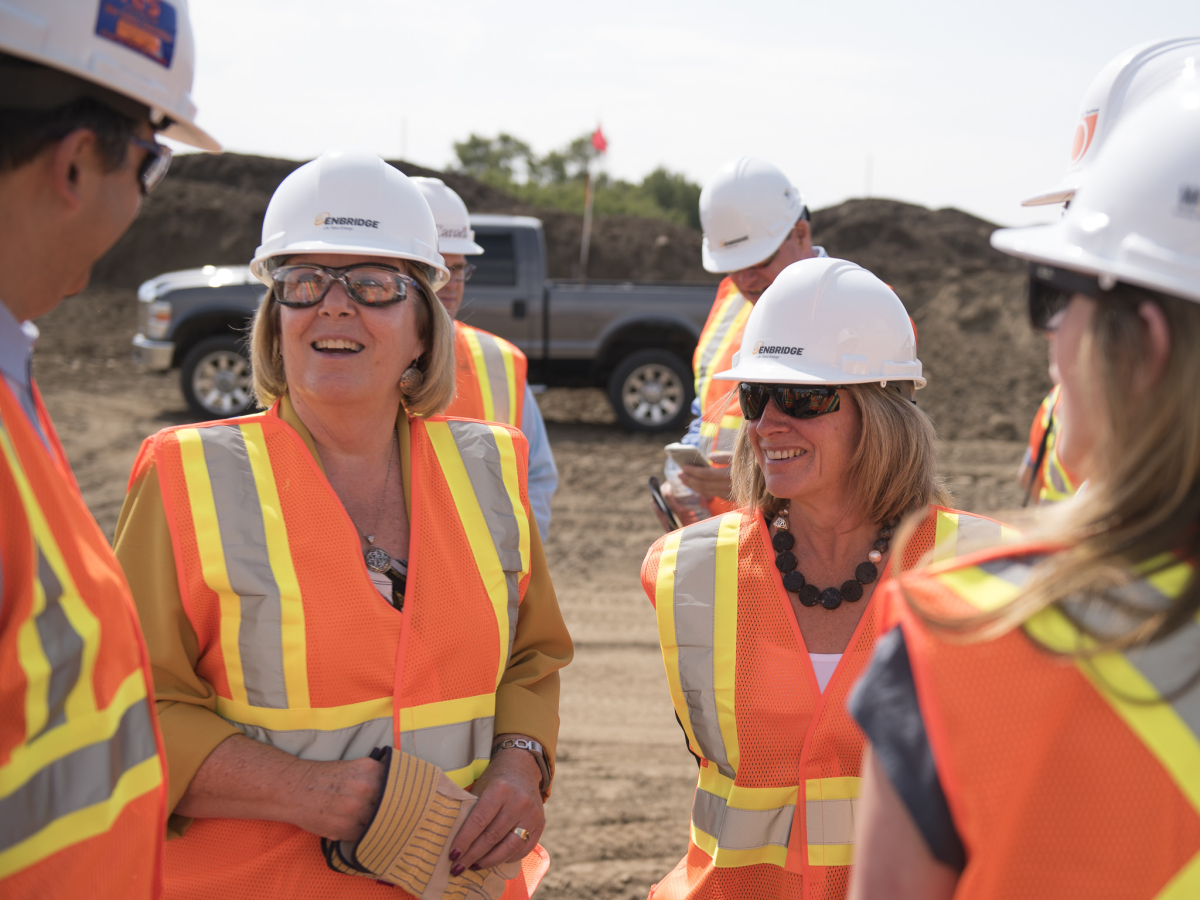Support strong Canadian climate journalism for 2025
Alberta's energy minister says taxpayers are "better protected" thanks to a Supreme Court of Canada decision Thursday that prioritized clean up costs for abandoned oil and gas wells before debts to creditors when companies go bankrupt.
But two years after she began consultations with the energy industry, Margaret McCuaig-Boyd told reporters the New Democratic Party government has no firm timeline to introduce new rules that might limit a multi-billion-dollar public liability for reclaiming about 80,000 inactive wells around Alberta.
The Alberta Energy Regulator has publicly stated that the cost of liabilities for the provincially-regulated operations and facilities, including oilsands tailings ponds, pipelines and is nearly $60 billion. However, in internal documents, the regulator estimates a total as high as $260 billion.
"The good players don't want to pay for the bad actors," McCuaig-Boyd said. "We're taking the time to do this right."
In a 5-2 decision, the Supreme Court of Canada overturned two lower court decisions that said federal bankruptcy law has paramountcy over provincial environmental responsibilities in the case of Redwater Energy which became insolvent in 2015.
The case pitted the provincial regulator against ATB Financial — a financial services firm that is also a provincial Crown corporation in Alberta. ATB Financial had provided financing to Redwater and wanted to recover its investments through the bankrupt oil company's remaining assets.
"The court's decision means Albertans are better protected from the few irresponsible producers and operators in the system," McCuaig-Boyd said.
"Working families across this province as well as all of Canada should not have to pay for the financial and environmental liability left when companies walk away from their obligations."
The largest lobby group representing oil and gas companies, the Canadian Association of Petroleum Producers, said it was "encouraged" by the ruling.
“CAPP has argued on behalf of industry that when a company declares bankruptcy, the value of any assets should go to abandonment and reclamation costs first," said Brad Herald, vice-president of western Canada operations at the lobby group, in a statement.
He said that an industry-funded group, the Orphan Well Association, set up to manage sites abandoned by bankrupt companies, should be a "last resort and only used after all other sources of funding are exhausted."
"CAPP believes that this judgment restores the balance between environmental obligations and creditor interests to that which existed for many years before this case," he continued in the statement. "CAPP will continue reviewing the details of the judgment to assess the full implications of the ruling.”
Clear reclamation plan needed, says Pembina Institute
In Ottawa, NDP MP Linda Duncan, who represents an Edmonton riding in Parliament, urged the Trudeau government to follow up on the ruling by expediting other legal reforms needed to ensure that companies don’t download environmental clean up costs on landowners or taxpayers.
“For too long, the Canadian government has allowed companies walk away from their responsibilities to cleanup abandoned wells,” Duncan said in a statement. “The Liberal government has a chance to show that they are putting Canadians’ interests first by fixing the legislation and helping protect the environment.”
The Pembina Institute says Alberta needs to develop a clear plan to reclaim inactive wells because it only holds $1.2 billion in security from companies to protect the public purse from reclamation costs.
"While the Supreme Court's decision ensures bankrupt companies' remaining assets first go to clean up, those assets are often insufficient to cover full costs," Pembina analyst Jodi McNeill said in a prepared statement.
"All political parties in the province must make clear commitments on how they will substantively address this issue moving forward."
A spokeswoman for the United Conservative party, Alberta's official Opposition, responded to a request for comment from National Observer with a written statement explaining that it would soon offer details about its plan to tackle the issue of abandoned wells.
"We of course recognize that companies need to take responsibility for mitigation after the natural life of a well," spokeswoman Christine Myatt said in the statement. "Our platform is still under development and we will have more to say about our plan to address the abandoned well issue closer to the election."
McNeill, from the Pembina Institute, said the situation in Alberta is exacerbated because successive governments have neglected for decades to address the issue by failing to impose strict timelines by which inactive wells must be reclaimed. They have also failed to collect adequate financial guarantees from companies to ensure there is money to pay for the work, she explained.
"You want to solve the problem effectively now, but you can't impose stringent measures overnight that would push already struggling companies into insolvency," she told National Observer, in an interview.
As a starting point, McNeil said the Alberta Energy Regulator needs to be more transparent about how the agency calculates the unfunded liability for cleaning up inactive wells. Many experts say these estimates have been grossly underestimated.
"It's hard to talk about solving a problem when you don't really know how large it is," she said.
Alberta Liberal leader David Khan tweeted Thursday that his party's platform will "insist irresponsible energy producers must pay to clean up their mess."
The 2017-2018 annual report of Alberta's Orphan Well Association, which is funded by both industry and government, said their inventory of abandoned wells and facilities that must be reclaimed has doubled since 2015 and has placed "significant pressure" on their staff.
Still, the report says "the increase in orphan properties is expected to continue as there are nearly 30 companies within Alberta's regulatory jurisdiction that are currently insolvent."
Most sites low risk, says Orphan Well Association
The association's figures show that as of January, 2019, there are 3,127 wells that need to be plugged or abandoned and another 1,553 sites that have already been abandoned but have yet to be cleaned up.
Using a federal grant of $30 million to cover interest costs, the province has provided the association with a $235-million loan to manage the rising number of orphan facilities.
In a prepared statement reacting to the court decision, the association said it expects to decommission over 700 wells in the year ending March 31, a three-fold increase over the previous year.
"This problem has developed over several years and it will take several years to address," the statement said.
"The vast majority of sites in our inventory are considered low risk and therefore do not require immediate closure."
Under current rules in Alberta, wells can remain inactive indefinitely so long as companies make surface lease payments to the landowner.
McCuaig-Boyd said her department is considering new rules that would impose financial health requirements on energy companies and timelines by which inactive wells must be reclaimed.
"We are looking at hard timelines and targets for abandoning and closing wells," she said. "We do need to have tight timelines."
The Alberta Party issued a statement predicting the ruling will impact the energy industry's access to capital, but leader Stephen Mandel said it was the right decision for the province's environment.
Mandel, a former Progressive Conservative minister, said he was troubled by the failings of previous Tory regimes to address the issue of well remediation and he called on the NDP to close loopholes that allow companies to evade cleanup costs.
"This means giving both industry and lenders certainty around their obligations, and Albertans certainty on reclamation and remediation commitments being fulfilled," he said.
This story was updated at 5:19 p.m. ET on Jan. 31, 2019 with Alberta Party comment. It was updated again at 9:52 p.m. ET with new comments from the United Conservative Party and the Pembina Institute.






Comments
No. Say it ain't so.
Ralph Klein removed the province's brain over 30 years ago and Albertans have been eating it out of their Lunch pails ever since.
"...Alberta's Orphan Well Association, which is funded by both industry and government" are "Using a federal grant of $30 million to cover interest costs, the province has provided the association with a $235-million loan to manage the rising number of orphan facilities."
So Federal taxpayers are covering interest costs for Alberta taxpayers to loan $235 million to the Orphan Well Association...what does industry pay for...the coffee and donuts at their meetings in the CAPP boardroom?
Insanity prevails.
And chickens come home to roost while only Chicken Little could see the storm coming but the big guys in the farmyard stomped on her.
As always, the answer is "there is no such thing as a free lunch" - but only criminals and politicians are unable to reason that far.
The liabilities involved in well cleanup are only a small part of the overall liabilities left by the oil and gas industry in Alberta . There has been no action to address the environmental and public health harms accruing from the beginning of horizontal hydraulic fracturing. As Governor Cuomo of New York state has said, this process results in "extreme risk to public health at all stages of operations." Our environment will never be the same, after this process, which has spread like a plague across Alberta. Only when serious assessment of environmental damage is done will we even be able to calculate the huge cost of the disastrous decision to allow this in our province.